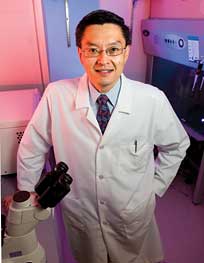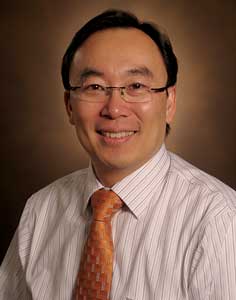Quick Takes
News From Around the Cancer Center
March 21, 2012
Pao to lead Hematology and Oncology
William Pao, M.D., Ph.D., Ingram Associate Professor of Cancer Research and director of Personalized Cancer Medicine at Vanderbilt, has been named director of the Division of Hematology and Oncology in the Department of Medicine.
Pao completed his undergraduate education at Harvard University and his medical and graduate education at Yale University before completing residency training at New York-Presbyterian Hospital, Weill-Cornell School of Medicine.
As a fellow working in the laboratory of Harold Varmus, M.D., Pao first identified EGF receptor mutations that convey sensitivity to gefitinib and erlotinib in lung cancers in non-smokers. This landmark work has been cited more than 1,440 times since its publication in 2004.

William Pao, M.D., Ph.D., has been named director of the Division of Hematology and Oncology. (Photo by Susan Urmy)
In 2009, Pao joined the faculty of the Division of Hematology and Oncology at Vanderbilt as an Ingram Associate Professor for Cancer Research and became the director of Vanderbilt-Ingram’s Personalized Cancer Medicine Initiative (PCMI). Vanderbilt-Ingram patients with melanoma, breast cancer and some forms of lung cancer routinely have their tumors tested for mutations that are sensitive to specific therapies. This commitment to matching the right patient to the right treatment at the right time is a hallmark of personalized medicine, and under Pao’s leadership the PCMI will soon be adding tests for other forms of cancer.
Pao is also the co-founder, with Mia Levy, M.D., Ph.D., of My Cancer Genome, an online tool to enable a genetically informed approach to cancer medicine.
“William Pao is an exceptional physician-scientist who has a passion for changing the face of oncology care through translating research discoveries to patients,” said Jennifer Pietenpol, Ph.D., director of Vanderbilt-Ingram. “We are fortunate to have someone with his combination of talents in a leadership position at Vanderbilt.”
“I am humbled by this opportunity to serve in this new leadership capacity,” said Pao. “The Division of Hematology and Oncology is filled with talented and dedicated faculty members who have established Vanderbilt’s reputation for excellence and I am looking forward to working together to enhance that reputation.”
– by Cynthia Manley
Employee Health Programs Targeting Cancer Recognized
Vanderbilt University Medical Center, in conjunction with the Vanderbilt-Ingram Cancer Center, was recently re-accredited as a CEO Cancer Gold Standard employer for 2011.
The award is based on Vanderbilt’s efforts to help employees lead healthier lives, including activities that may help prevent cancer.
To earn the two-year accreditation, an organization must establish programs to discourage tobacco use, encourage physical activity, promote healthy diet and nutrition, detect cancer at its earliest stages and provide access to quality care, including participation in clinical trials.
VUMC banned smoking from the Medical Center campus in October 2008, provides free access to the HealthPlus fitness facility for eligible staff members, offers more healthy food options in the food courts and encourages staff to engage in exercise through activities like the Start! walking program.
The CEO Roundtable on Cancer was founded in 2001 when former President George H.W. Bush challenged a group of executives to “do something bold and venturesome about cancer within your own corporate families.”
– by Dagny Stuart
VICC Expands Research Administration
Lauren Hackett, MPA, has been named executive director for cancer research administration at Vanderbilt-Ingram Cancer Center.
Hackett has 19 years of experience in research administration, most recently at New York University Cancer Institute, where she has served as executive director for administration since 2004. She held similar roles with the Yale School of Medicine and Yale Cancer Center.
She will work alongside Beth Price, MBA, who has been named executive director for cancer clinical administration, and Michael Neuss, M.D., Vanderbilt-Ingram’s new chief medical officer.
“When the Cancer Center was launched in 1993 our research portfolio was $39 million. Today, our research funding for clinical, basic and population-based research approaches $200 million and accounts for a substantial portion of the VUMC research portfolio,” said Jennifer Pietenpol, Ph.D., director of Vanderbilt-Ingram.
“Moreover, we face an imperative to grow our clinical activities to meet the demands of an aging population as well as to deliver cutting-edge clinical research that is crucial to our mission as a Comprehensive Cancer Center.”
The Cancer Center’s highly integrated research and clinical enterprises require and deserve the attention of an executive level administrator with specialized skills and experience, Pietenpol said.
Hackett holds a master’s degree in public administration from the University of New Haven and a bachelor’s degree in psychology from the University of Massachusetts, Amherst.
At NYU Langone Medical Center, Hackett was responsible for financial, administrative and planning activities for the Cancer Institute across the research spectrum, including clinical, basic and population-based efforts. Hackett also directed the office of sponsored programs administration at the Rockefeller University, and worked in the public sector with the Brookline, Mass., Human Relations-Youth Services Commission.
– by Dagny Stuart
Cancer Center Debuts Clinic in Green Hills
Vanderbilt-Ingram Cancer Center has opened a freestanding cancer clinic in Green Hills to give cancer patients more options for their oncology care.
Vanderbilt-Ingram Cancer Center at Green Hills provides many of the same services available at the main campus, including access to board-certified cancer physicians and specially trained oncology nurses and pharmacists.
Patients can see an oncologist, have their laboratory tests performed and receive their chemotherapy all in one location.
Chemotherapy drugs are prepared onsite in the specially equipped pharmacy to reduce the amount of time patients spend waiting for drug infusions.
Patients who receive their care in the Green Hills facility are eligible for enrollment in clinical research trials available at Vanderbilt-Ingram.

Vanderbilt-Ingram recently opened a freestanding clinic in Green Hills. (Photo by Steve Green)
“At the new VICC Green Hills clinic we are providing the same high-quality standard of care that our patients have come to expect in all of our cancer facilities,” said Michael Neuss, M.D., chief medical officer for Vanderbilt-Ingram.
“We are committed to reaching out to a wider community so that we can bring our expertise and access to clinical research trials to patients in the most convenient setting possible.”
The new clinic was designed and built to be environmentally sensitive. The LEED-certified space is decorated in relaxing shades of blue and green with earth-tone accents and features a large, open waiting room, six patient exam rooms and 11 chemotherapy chairs.
The clinic is located in the Freeman Webb office building, behind the Mall at Green Hills, at 3810 Bedford Ave., Suite 100, near the intersection with Crestmoor Road. Free parking is available in front of the building.
In addition to Vanderbilt-Ingram oncologists who are already seeing some patients at the Green Hills clinic, Vanderbilt has hired Hammad Rashid, M.D., as the first full-time hematologist/oncologist to join the Green Hills staff.
After receiving his medical degree, Rashid served his residency in internal medicine at a hospital affiliated with Cornell University in New York, and completed a fellowship in hematology/oncology at the Medical University of South Carolina in Charleston.
Rashid is board certified in hematology, oncology and internal medicine and was in private practice for several years in Ohio and Texas before joining the Vanderbilt-Ingram faculty.
“Vanderbilt has a very strong basic science department and their clinical footprint has been expanding,” Rashid said. “I wanted to be part of that community of doctors who are at the forefront of clinical research, with national and international recognition, while still being able to see all kinds of hematological and oncological diseases.”
For more information or to schedule an appointment, call (615) 936-8422.
– by Dagny Stuart
VICC physicians, programs recognized
Two popular surveys that recognize physician expertise have again included hundreds of doctors from Vanderbilt University Medical Center, including 40 involved in the care for cancer patients and their caregivers.
America’s Top Doctors listed 59 Vanderbilt physicians, while Best Doctors in America included 227 Vanderbilt faculty members.
Vanderbilt University Medical Center also recently achieved distinction as one of the nation’s leading health care providers from U.S. News and World Report in the publication’s annual rankings for “America’s Best Hospitals.”
This year, VUMC garnered a best-ever No. 14 ranking on U.S. News’ prestigious national “Honor Roll,” the designation reserved for a select group of the nation’s highest-performing health care providers.
In addition, Vanderbilt-Ingram Cancer Center was the only cancer center in Tennessee ranked among the best for cancer care.
– by John Howser/Leslie Hill
Quantitative Sciences Center to Manage Data
Yu Shyr, Ph.D., professor of Biostatistics, Cancer Biology and Preventive Medicine and Biomedical Informatics, and chief of the Division of Cancer Biostatistics, has been named director of the newly formed Center for Quantitative Sciences.
The Center for Quantitative Sciences was created in response to a shift in biomedical research toward generating high dimensional data sets, especially in the context of clinical and translational studies. For example, traditional research focuses on one or two biological features (proteins, genes, lipids, metabolites, etc.) at a time.
By contrast, cutting-edge “-omics” approaches (proteomics, genomics, lipidomics, metabolomics, etc.) generate data for thousands of biological features with each experiment. To derive real knowledge from such enormous amounts of data requires integrated capacities for data storage, management, preprocessing, analysis and interpretation.

Yu Shyr, Ph.D.
Shyr said that Vanderbilt-Ingram Cancer Center and the institution must have the infrastructure in place to provide such capacity. He plans to work with University as well as School of Medicine departments to recruit faculty and staff scientists from across quantitative disciplines to help analyze and manage data-intensive projects.
“If you do whole-genome sequencing, one patient’s data may require one-half a terabyte of storage space,” Shyr explained.
“We must be able to manage and analyze data so that the quantitative methods we are using are as transparent and reproducible as the methods section of the research paper,” said Shyr, who is also Ingram Professor of Cancer Research.
Integrating the material generated by investigators with the decision-support tools used by physicians is essential for the delivery of personalized medicine to patients, said Jennifer Pietenpol, Ph.D., director of Vanderbilt-Ingram.
“The ability to manage this vast amount of data and make it accessible and useful for scientists and physicians is what sets Vanderbilt apart from other cancer centers and universities,” said Pietenpol.
Though currently housed within the Cancer Center, the new center is available to assist all Vanderbilt investigators in integration of quantitative sciences across bioinformatics, biostatistics, biomathematics and computational biology.
“I am very honored to help lead this important enterprise,” Shyr said. “This center will create a multi-disciplinary resource that provides quantitative support, service and collaboration for data-intensive projects and major grant proposals for VUMC investigators. We are here to help people do better science.”
– by Dagny Stuart
Web Tool Wins Technology Award
Vanderbilt-Ingram Cancer Center physician-scientists who created the new online medical decision support tool called “My Cancer Genome” have been named winners of a $20,000 health care technology award sponsored by the National Cancer Institute.
The contest, “Using Public Data for Cancer Prevention and Control: From Innovation to Impact Developer Challenge,” was presented as part of the Office of the National Coordinator for Health Information Technology’s Investing in Innovation (i2) program.

(Image: iStockphoto.com)
The winners were announced by Health 2.0, an online venue that introduces and highlights technology innovations in health care.
My Cancer Genome was created by William Pao, M.D., Ph.D., Ingram Associate Professor of Cancer Research and director of Personalized Cancer Medicine and the Division of Hematology and Oncology, and Mia Levy, M.D., Ph.D., assistant professor of Biomedical Informatics and Medicine and Cancer Clinical Informatics Officer.
My Cancer Genome is a database with information about specific types of cancer, important genes and genetic tumor mutations, with links to recent studies and information about the latest recommended therapies.
Having current information about mutations found in tumors is crucial because some mutations are linked to tumor growth.
Physicians can match patients with specific tumor mutations to new medications that block the effects of those mutations and they can find information about clinical research trials under way in the United States.
During an average week, 1,300 physicians, researchers and patients visit the MyCancerGenome.org website.
The database has now been viewed by people in 120 countries and has gained health care contributors from five countries.
My Cancer Genome was launched in 2011 with information about melanoma and lung cancer, and now contains data on six cancer types.
The database will be expanded over time to include information about additional types of cancer.
– by Dagny Stuart
